Fighting for Lady Liberty Exhibit Showcases Local History and Current Fight for the Equal Rights Amendment
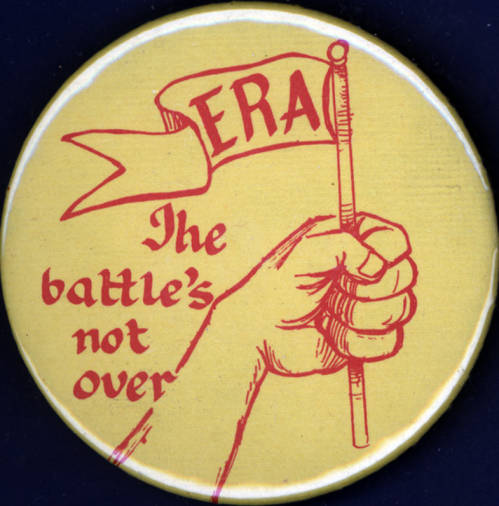
Edit 3/18: This year’s event, “ERA: ABSOLUTELY YES!” will celebrate the 25th Anniversary of the Women’s Collections at GSU and had been scheduled for April. However, with guidance from the University System of Georgia, the university has announced that campuses will remain closed to students and the public through the semester and all face to face events will be postponed. Out of an abundance of caution regarding the current coronavirus situation we feel that it’s in everyone’s best interests to postpone the event until the middle of September.
In commemoration of the 25th anniversary of the Women’s Collections in GSU’s archives, we’re pleased to feature a special exhibit on the history of the Equal Rights Amendment. This exhibit will present a history of the ERA, with a focus on the fight for ratification in Georgia. On Tuesday, April 14th the exhibit will open with a panel discussing the past and future of the amendment, and we’ll be handing out replicas of vintage ERA buttons that will feature in the exhibit.
To get a better idea of the thinking behind the exhibit we recently spoke with Samantha Harvel, who is working on the exhibit with Michelle Asci, Morna Gerrard, and Hilary Morrish. Harvel brings curiosity, a fresh perspective, and commitment to equality and social justice to this project. She began working in Special Collections as a freshman honors student during her undergraduate degree in History and Women’s, Gender and Sexuality Studies. A former Miss Georgia State winner, Harvel is now a graduate student in the History Department, recipient of Our Mother’s Fund award, and enjoys music and baking during the scant free time she has between projects. We’re thrilled to have her back in Special Collections as the primary curator of the ERA exhibit!
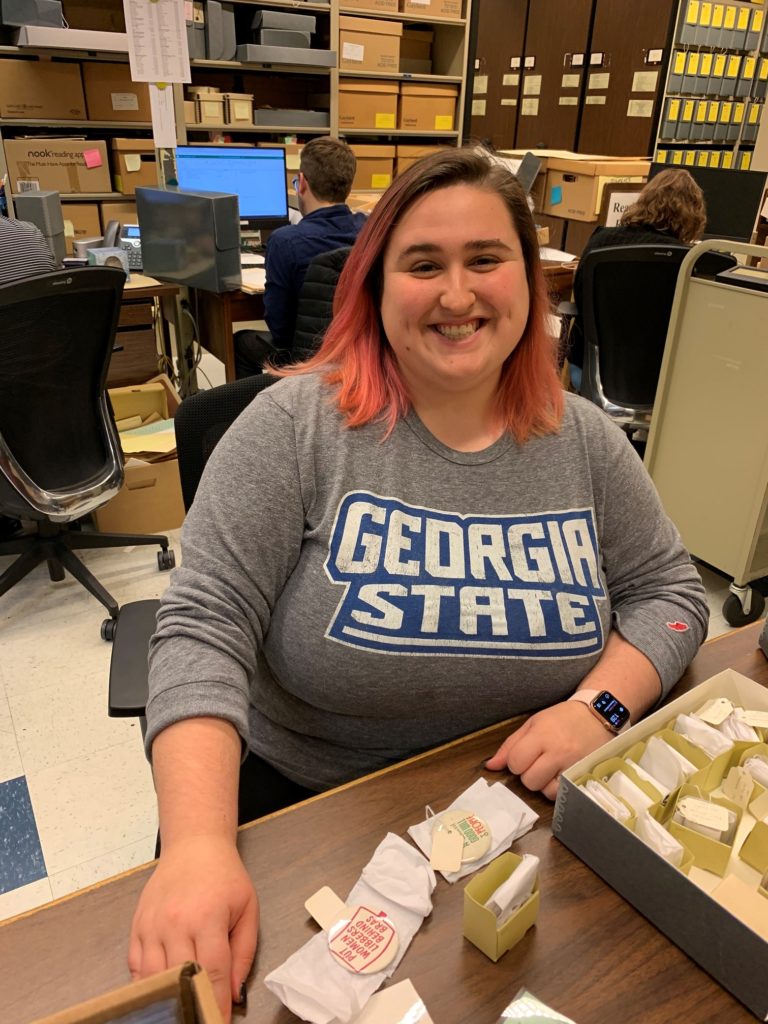
What are you working on right now?
I am working on an exhibit celebrating the 25th anniversary of the Women’s Collections at Georgia State University.
What’s the exhibit going to be about?
It’s about the ERA tracing its creation in 1923 to the present day, but especially focusing on the women who were fighting for it in Georgia.
What is the ERA?
The ERA stands for the Equal Rights Amendment, a proposed constitutional amendment that would protect from discrimination on the basis of sex. It was passed by Congress in 1972, but it hasn’t been ratified by enough states. It specifically mentions sex, which is otherwise not mentioned in the constitution.
What did you know about the ERA before you started working on the exhibit?
I knew it existed… (laughs). The first I’d heard about it was seeing “Yes ERA” buttons and related imagery associated with historical feminism, but no one ever really explained what it was. I learned some of the background during a screening we had here of a documentary about the amendment, Equal Means Equal. Other than that, I pretty much knew nothing coming into this, so I had to do several weeks of intense research to make sure I had enough background information.
I think a lot of people don’t know about it. The wild thing is, I was a WGSS minor, so I studied feminism and women’s movements and I still had never heard of this.
Has the ERA passed in Georgia?
No. It has been voted or pushed down more than four times. I was looking at the papers of GA legislature Cathey Steinberg, one of the primary sponsors of the ERA the second time around, and one of her documents mentioned four times, and that was in the 80s.

After your preliminary research, how did the archives shape your understanding of the ERA fight in Georgia?
The first research I did in the archives was listening to oral histories. I felt it was most important to hear what mattered to those women: what things stood out to them enough to talk about it years later, which parts most excited them, which parts were the most frustrating, what do they remember the most. I used that to guide what I decided to talk about in my exhibition panels and which collections I should be looking at. For example, a lot of the women recalled how ridiculous they felt the rhetoric of the other side was. I really wanted to talk about that rhetoric, especially since it’s a lot of the same stuff we’re seeing today.
A lot of women got involved through their churches, which I thought was really cool. Not all of them were these “crazy career, bra-burning feminists” [laughs], but a lot of them were working or stay at home moms and housewives. There was a campaign called Housewives for the ERA.
Were there any specific Oral Histories that made an impact on you?
My favorite is Margaret Curtis. She wrote over 500 letters to the editor to the different Atlanta newspapers. It got to the point where they sent her a letter that said we only accept one letter by an author per week. So she started ghostwriting for other people. All of her friends and family would let her use their names. We’re actually going to be using her typewriter in the exhibit. She’s funny, has a quick wit, a stay at home mom, religious, and was very involved in the fight for the ERA in Georgia.
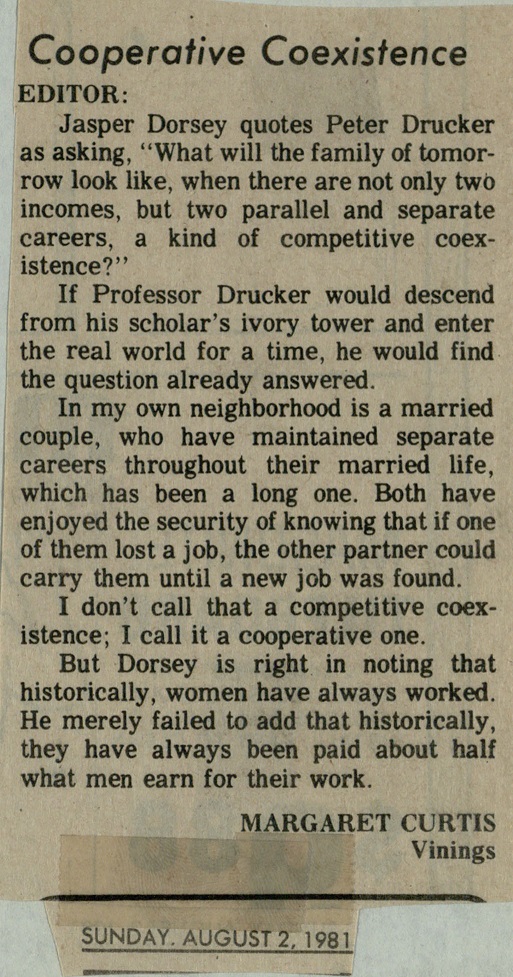
Letters to the editor, numbers 114-166, 1980-1981
How was the rhetoric of over the fight for the ERA similar to the political rhetoric we hear today?
If you’re familiar with the bathroom bills, that had to do with transgender people, there’s a panic over the idea of gender neutral restrooms or men and women sharing bathrooms in any capacity, based on the bigoted and fundamentally incorrect opinion of people that think trans women are men. A huge thing reiterated in the archival materials is the idea that having the ERA will eliminate separate sex bathrooms, that we will only have coed bathrooms. There’s also women in the draft, which is still brought up to this day. If we have full rights for women should they have to register for the draft? Also, the issue of gay marriage, there was a panic that if the ERA passed it would lead to the allowance of homosexual marriage.
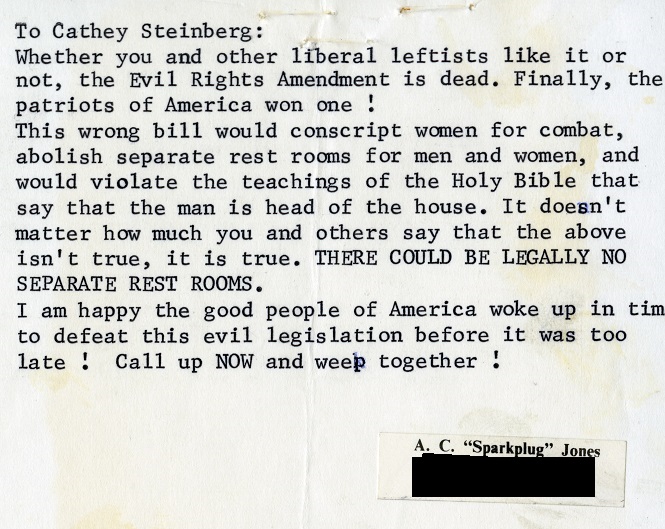
So the ERA’s about more than just voting?
It’s protection from any discrimination on the basis of sex. So for jobs, wage was definitely a factor. The equal pay act had been passed but had not been effective. Interestingly though, when the ERA was first introduced, labor movements were against it. Women had just won some protections, but family life was very different at that time. Women who worked outside the home were still primarily housewives, but with a job. They had all these responsibilities, had children, but they didn’t have a lot of legal rights. So many in the labor movement were worried that the ERA might strip away those small wins.

What surprised you as you searched through these primary sources?
The most recent surprising thing to me is how much the rhetoric sounds like crazy internet conspiracy theories (laughs). I was reading an anti-ERA document yesterday where a woman who was the president of the local Eagle Forum, which was a big conservative organization, was warning legislatures that the ERA would allow men and women to attend “heterosexual massage parlors”…it didn’t make any sense. These crazy theories came out, kind of a “fake news” type of thing, that honestly was probably harder to disprove at that time, where someone would send a letter to a legislature that claimed to be an official report about the effects of the ERA but was in fact made up of ridiculous theories. But it was everywhere: in newspapers, in little pamphlets being handed out, in the documents the women in the anti-ERA organizations were sending it to legislatures.
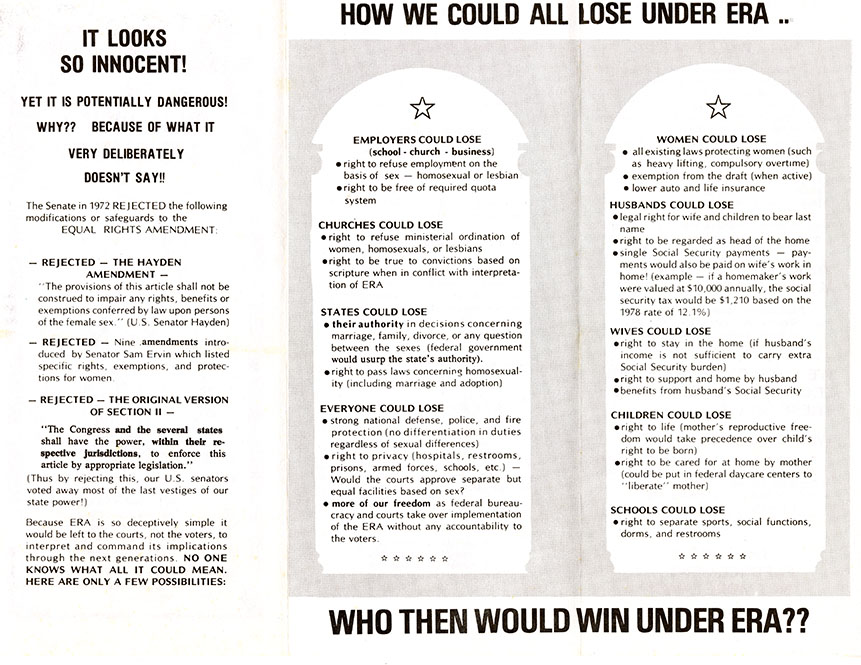
Was there anything you found that made you angry?
Something that made me upset yesterday was some very violent anti-Semitic language used towards Cathey Steinberg. Someone sent her very nasty messages written on a newspaper, which she scanned. This kind of goes into the internet conspiracy rhetoric, the person was saying we don’t need a Jewish conspiracy to control our minds and that the ERA was a ploy by Mossad, the intelligence agency in Israel.
It’s also frustrating to me that so many people who opposed the ERA were women. The main driving forces that ran Stop ERA, the major organization dedicated to defeating the ERA ran by Phyllis Schlafly (S.T.O.P. stands for Stop Taking Our Privileges), were affluent and middle class women who viewed this movement as a threat to their privileges. It’s infuriating to see people arguing against their own rights. They would really play into men’s idea of women to get them to reject the amendment. They would make themselves seem weak, even though they’re women running a national organization. I read their guidebooks which dictated they had to dress in a certain way, and sit pretty, and talk in a certain tone so as not to offend the men, and they would bring the men pies and jams… These are strong women that used stereotypes to manipulate powerful men, which is cool but also infuriating.
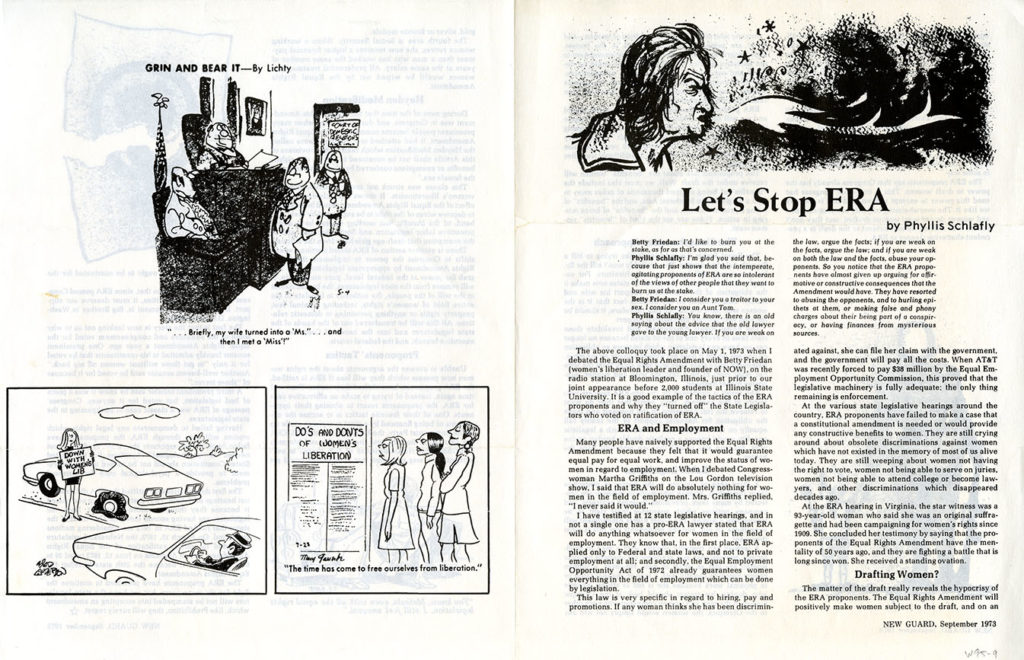
A lot of their concerns had to do with traditional “Christian values.” They felt that we were placed on this earth for a very specific role, which is serving our husbands, and we don’t need a constitutional amendment to protect us when that’s what our husbands do. They also were concerned, and to me these were valid (though disproven) concerns, about alimony, and about social security benefits for widows. There were also of course things like homosexual marriage, coed bathrooms, and women in the draft. A frequent topic was “do you want your man sleeping in barracks or sharing a foxhole with a woman?” I recently came across what was supposedly a testimony by a brigadier general, where he stated something to the effect that “Israel only has 3% women involvement in the military, and other countries only have 2%… we have 8% and I think that’s why our military is weak, so do you really want more? I have two daughters and two sons and I can say that I would never want my daughters to have to be around those men and I would never want my sons to have to depend on my daughters.” It was like, wow, what a way to insult your daughters on a nationally distributed pamphlet.
How are you selecting which items to feature at the exhibition? What kind of stories do you want to tell?
The hardest part right now is trying to choose between the great fliers in this collection: do I pick something visually dynamic, a flier with great information, or something specifically about the rally at Sparks Hall that directly connects these issues with students at Georgia State.
Has there been anything particularly heartbreaking to leave out?
Given the space, I would love to have panels on more of the women that have donated their papers on the ERA. Their stories are so interesting and so varied that they would connect with so many different types of people. We include a limited selection of pictures and articles written by these women, but I don’t have the space to fully tell their stories: where they come from, why they did what they did, what they felt when they lost, or if they kept going. That information really humanizes these stories. But it is available to the public and posterity through our collections!